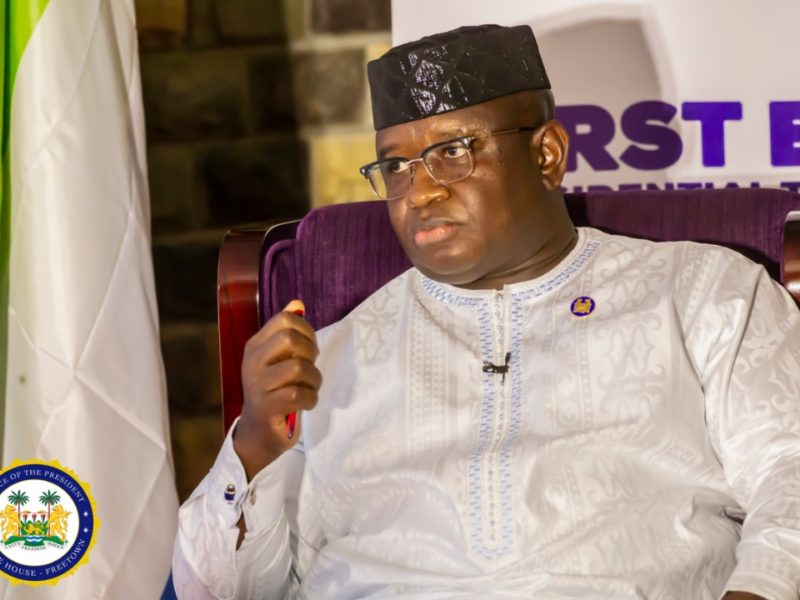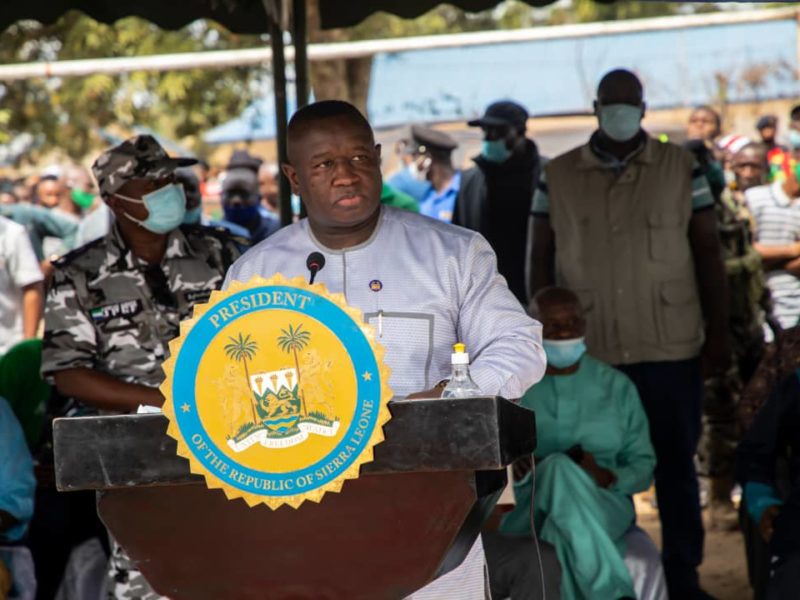President Ernest Koroma @5
I listened to few civil society activists on Star Radio on the 17th September, being asked to rate the performance of the Koroma led government after five years in governance. Alhaji Waritay and Charles Mambu, in my view gave a good rating of the President, especially when they themselves attempted to catalogue some of the achievements, though taking into account the numerous challenges still existing with us. For Waritay, “the country is moving…” and for Mambu, “more powers have now been provided to the ACC…”and that the government has improved the country based on the provisions contained in the Agenda for Change. He referred to the free speech as part of the governance success of President Koroma. “…generally they have done what they could…”said Charles Mambu. I need not refer to the words of Alhaji Alpha Kanu, in terms of him cataloguing what has been achieved by President Koroma in five years. From free health care, to electricity, fight against corruption to infrastructure, he said a lot. “We are now referred as the fastest growing economy…”Minister Kanu said. (Photo; John Pa Baimba Sesay, IA, China)
He is five years old in state governance today, 17th September. He came to political prominence at a time when the people of Sierra Leone were agitating for change, both at the political, social and economic fronts of the country. He also came to power at a time when the international community could no longer trust the manner in which their donor support to Sierra Leone was been utilized, to the point that they were left with no other option but to put a stop to such support coming home.
O yes, President Ernest Bai Koroma came to power at a time when the situation of the agriculture sector in Sierra Leone was in a state that required immediate attention, especially for a country where agriculture contributes over 45% of our GDP, employs over two-thirds of the population and generates about a quarter of the export income. Budgetary allocation to the sector was at a paltry 1.6%; agricultural productivity was very low and farming (abandoned mainly to the rural poor) was basically for subsistence, but budgetary allocation now been increased to well over 9%, in less than five years in governance by Ernest Koroma.
Indeed, he came to political prominence at a time when our country’s infrastructure was in a gloomy state. At a time when no sense of importance existed in relation to the safeguarding, rehabilitation or construction of roads, at a time when work on the few roads marked for rehabilitation or social infrastructure projects moved at a very slow pace or had completely stalled as a result of the contracts been badly awarded and executed. By September 17th of 2007, the picture of Sierra Leone, at night, was dark, very dark. Electricity supply was available only in Freetown, Bo and Kenema; even at that, it was not dependable. And by the time President Koroma assumed office, the demand for electricity was high up, the supply very low.
Also by September 2007, Sierra Leone was among countries listed as one of the “wrong places for doing business”. Soon after coming to power, President Koroma identified the problem as being too bureaucratic with business policies and practices that held very little significance and bogged down the process. Before 2007, the fisheries sector in Sierra Leone was as chaotic as the word itself: In fact the Fisheries Policy 2003 had no implementation strategies and no annual management plans were in place. The fisheries outstations were dysfunctional, and revenue collection was neither effective, nor properly coordinated, and total amount generated from licensing of fishing vessels, trans-shipment and fines were a meagre five million Leones. Also, the landing obligations of fishing vessels were not properly enforced and monitored.
At the educational front, while some progress was been made in improving human resources at country level, several challenges remained when the Koroma government took office in 2007. There was a critical shortage of skilled middle level personnel across the education sector in Sierra Leone. The expansion of schools had not been matched with a corresponding increase in staff to run schools. And a few other ills! This problem was especially acute in the rural areas. But as we speak today even after five years of a Koroma Presidency, the situation has completely changed in Sierra Leone from the viewpoint of infrastructure, fight against corruption, the delivery of the health care services, in the aspect of education and a host of others. It is also important to note, that President Koroma was elected five years ago and at a time when the power of media and communication was never given attention as little or nothing was known about government’s successes at the time. A government that fails to communicate is doom to fail. And realizing this vital aspect in governance, today, the Koroma Presidency has ensured a robust form of public communication, through an effective Information Ministry, headed by professionals in communications and journalism. I once submitted that Hon. I B Kargbo’s oratory skills, coupled with his power to convince people on issues of national development have been of great success in the sustenance of the APC rule. He has been a good Minister and what we have also seen, in terms of the decision by the President to blend IB’s ability to properly communicate issues to people, with the ability of Hon. Sheka Tarawali in terms of writing and addressing issues in the media is just too great and superb.( http://www.cocorioko.net/?p=21620)
When President Ernest Bai Koroma assumed power five years ago today, one of his first priorities was to work towards the implementation of an Agenda for Change. This ‘Agenda for Change’ has always been aimed at moving the country to a new direction in the areas of agriculture, infrastructure, education, health energy and power. And within five years, one could vouch that there has been tremendous progress in the implementation of this ‘Agenda for Change’. Energy is now a priority to the point that, in 2009, the President spoke of his “committed to harnessing the enormous hydro-electric potential in our rivers and waterways, as well as to developing biofuels and solar energy….” all in a bid to power our economic development without harming the environment. And so what we have seen in five years of a Koroma Presidency is a transformative progress in the sense, that, there has today been an increase in the national electricity generation capacity to over 90MW, with a target for 218MW by 2013. Our goal with all these projects “is to attain energy independence and optimize our full potential in power generation .There has been an installation of a 10MW thermal plant at the Kingtom Power Station, West of Freetown. This was a way of supplementing electricity supply to the Western Area, as also was the case with the installation of a two thermal plants of 8.25 MW at the Black hall Road Power station to supplement power from Bumbuna especially during the dry season.
The fight against corruption took a different dimension with the body responsible to fight corruption,(Anti Corruption Commission) now having prosecutorial powers to charge corruption related matters to court, with no government interference. The President has also been acclaimed for declaring his assets, in accordance with provision in the Anti Corruption Commission Act 2008. Also in five years we have seen an increase in spending on infrastructure and other capital projects from under Le180 billion to over Le450 billion on a new development agenda. We have seen how the government has listed infrastructural development as a priority area in the agenda for change. And with the required leadership provided by President Koroma, the country has rolled-out the largest road construction programme ever in her history. In terms of decentralization, the government ensured an unprecedented increase and predictable flow of funds to local councils which today, helped in ensuring a phenomenal degree of success in projects implementation by the councils nationwide. Between 2008 and 2010, the government and the country’s development partners implemented 62 service delivery projects to the 19 local councils nationwide. It was only the Koroma Presidency that had the zeal to introduce a free health care scheme in the country, which has today been of great help to the country.
In the fisheries sector and more so in the last five years, Sierra Leone has been implementing a five years West Africa Regional Fisheries Program, aimed at strengthening the country’s capacity to effectively manage her fisheries sector. This project has three interrelated components namely; (A) Good governance and sustainable management of the fisheries; (B) Reduction of Illegal Fishing and (C) ensuring an Increase Local Value Addition to fish products and it seeks a 50% reduction of fishing vessels that are observed fishing within the 6-mile Inshore Exclusion Zone by the end of the project life cycle. It is supporting the strengthening of the Monitoring, Control and Surveillance of our waters to reduce illegal, unregulated and unreported (IUU) fishing and ensure that industrial fishing operations are carried out within the provisions of the laws of Sierra Leone. This has to do with the effective leadership that President Koroma has continued to provide in five years.
These successes notwithstanding, there are still huge challenges and that is why we implore on Sierra Leoneans to reelect President Koroma for another term given what he has done and what is in store for the country, from the viewpoint of what is contained in the Agenda for Change which is now moving to an Agenda for Prosperity.
Stay with Sierra Express Media, for your trusted place in news!
© 2012, https:. All rights reserved.





